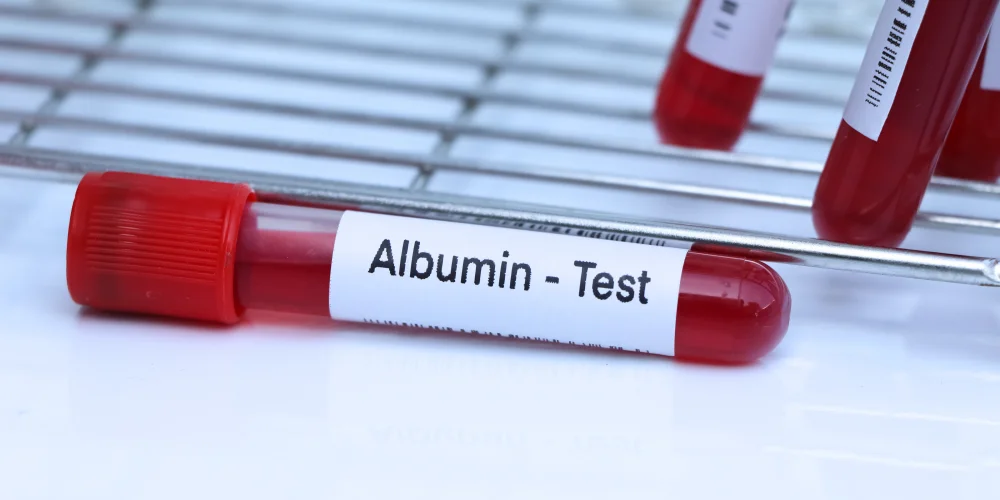Serum Albumin Test
Assessing Serum Albumin Levels
It is the Serum Albumin test is a instrument used for diagnosing the amount of albumin present in blood. Albumin is an essential organelle synthesized by the liver. It is vital for maintaining the balance of fluids within the body, as well as transporting the hormones, vitamins as well as drugs, while also assisting with immunity. The monitoring of serum albumin levels can provide vital information on general health as well as aids in diagnosing many medical conditions.

When is the S.Albumin Test Prescribed?
The test for S.Albumin is used in a variety of clinical situations to offer crucial insights into the health of patients and their management. It is, in the first place, the primary instrument to assess the function of the liver by testing the levels of albumin, which are produced by the liver. Abnormal levels could signal liver problems or impairment. In addition, it is crucial in the evaluation of nutrition health, assisting in identifying the presence of protein deficiencies by measuring the levels of proteins within the body.
In addition this test is valuable in assessing kidney function since low levels of albumin may indicate kidney damage or disease the kidney, especially in circumstances that affect the excretion of protein. It also aids in the evaluation of chronic diseases like inflammation, and where monitoring the levels of albumin can help determine diseases’ progression as well as the effectiveness of treatments. All in all this test Serum Albumin test is essential to diagnose and manage various health issues that are related to liver health renal function, nutritional status as well as chronic inflammation.
Preparation for the S.Albumin Test
A special diet is not usually needed for this test. S.Albumin test. Patients are able to take a normal diet and drink before the test unless otherwise instructed by a healthcare professional. It is essential to inform your healthcare doctor about any medication supplementation, recent health issues that could influence the results of the test.
Parameters Considered During S.Albumin Test
It is the S.Albumin test measures the level of albumin found in blood. The levels of albumin reflect your health of the body’s nutrition and functioning of the liver. It provides crucial data in the diagnosis and management of different health issues.
Time Required for S.Albumin Test Report
The results of the S.Albumin test are typically accessible within the next day. The speed of turnaround allows the rapid assessment of results and the proper medical guidelines.
S.Albumin Test Price
In Chirayu SuperSpeciality Hospital, the S.Albumin test price is Rs. 250, which is a fair price that allows access to vital data for diagnosis.
Book an Appointment for S.Albumin Test
Making an appointment for this test is simple and quick. It is possible to schedule your test on our site or call our customer support staff for help.
What Our Patients Say
Hear from our valued patients about their experiences at Chirayu Super Speciality Hospital and how our care has made a positive impact on their health and well-being.


Found the test very informative. Great support in understanding my overall health.


Helped detect my nutritional deficiency. Efficient and affordable testing.


Quick and painless process. Provided insights into my liver function. Thank you, Chirayu!


Accurate diagnosis, prompt results. Helpful in managing my treatment plan. Grateful for the service.


Essential for monitoring my chronic condition. Professional and caring service.


Efficient service, friendly staff. Vital for managing my nutritional health. Thank you, Chirayu!
Frequently Asked Questions
Here, we provide answers to some of the most commonly asked questions to help you better understand our services, policies, and facilities. If you have any additional questions, please do not hesitate to contact us.
A low serum albumin level may suggest liver disease, kidney disease, malnutrition, or chronic inflammatory conditions.
Yes, certain medications and supplements can influence serum albumin levels. It’s important to inform your healthcare provider about all medications you are taking.
No, fasting is generally not required for this test unless specified by your healthcare provider.
The frequency of testing depends on your health condition. Your healthcare provider will recommend the appropriate schedule for monitoring.
Abnormal levels may indicate underlying health issues. Further evaluation and treatment may be needed based on your test results.